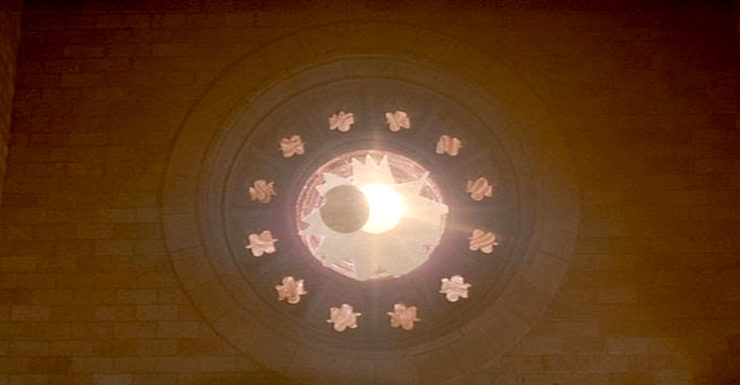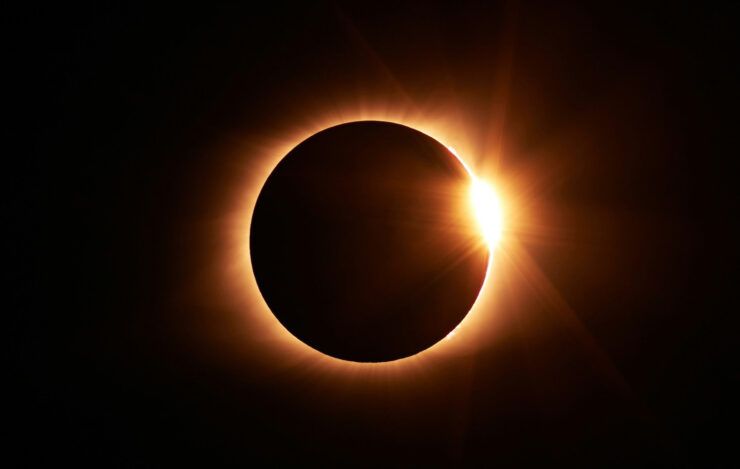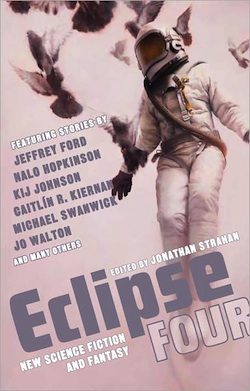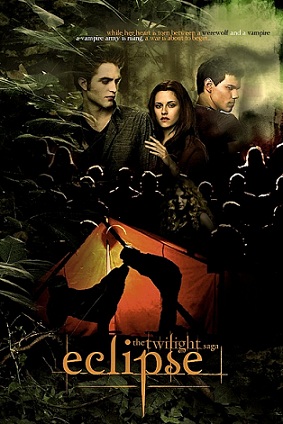Eclipses are pretty darn cool even in real life, so it’s fitting that in science fiction and fantasy they get their due as legitimately monumental events. Dragon’s blood shed, the sapping of powers, aliens invading under cover of darkness… a lot can happen when planetary bodies pass between the sun and Earth—or whatever world our heroes inhabit. The six eclipses in these SFF stories mean serious business, with the power to change laws, avoid executions, and break spells. Grab your eclipse glasses!
Little Shop of Horrors
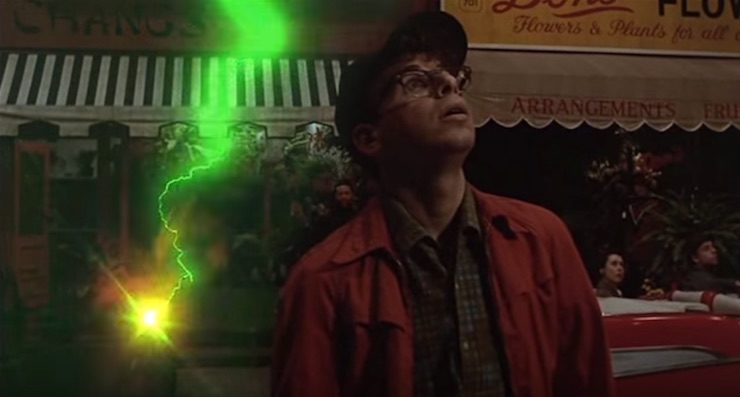
Most of the time your average eclipse occurs to bestow power or some kind of magical event. And then every once in a while a total eclipse of the sun happens to help an alien race deposit a bunch of their agents around your world for the purpose of total domination. Seymour Krelborn learned this the hard way when looking for new strange and exotic plants for his little horticultural hobby. Mr. Chang sold him a plant he had never seen before, one that just showed up among his other wares, right after an eclipse. A dollar ninety-five bought Seymour an unknown varietal that he christened the “Audrey II,” after his coworker and longtime crush.
And then the plant got a lot of attention in the flower shop where Seymour worked, and business started booming. And then Seymour discovered that the only way to keep the plant alive was by feeding it blood. And then the plant could talk suddenly? And then it didn’t seem like that big of a deal to murder Audrey’s abusive dentist boyfriend for the sake of keeping the plant alive… and it all sort of snowballed from there. Depending on the version you’ve seen, this either resulted in Seymour and Audrey’s deaths, or it resulted in a happily ever after that ominously ends with the appearance of more tiny Audrey Twos. The point is, don’t feed the plants, and also maybe don’t buy unknown flora during solar eclipses.
The White Gryphon
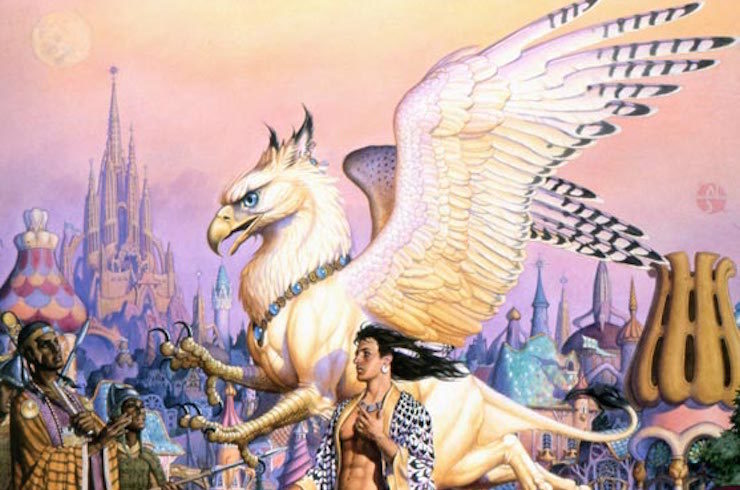
When the sun comes at midday, then change comes to the Haighlei…
Don’t like a particular law in the Haighlei Empire? Every 20 years, during the Eclipse Ceremony, you have the chance to change it. Assuming you’re an emperor, of course. And that the ramifications of various political marriages, foreign alliances, and advisor appointments haven’t altered Haighlei society so drastically as to render new social rules moot.
In the second installment of Mercedes Lackey and Larry Dixon’s Mage Wars trilogy, an embassy from White Gryphon attempts to negotiate an alliance with the people of Haighlei—conveniently during the timing of the Eclipse Ceremony. But when members of King Shalaman’s royal court begin turning up dead—members who opposed said treaty—protagonists Skandranon and Amberdrake come under suspicion. They have until the end of the Eclipse Ceremony to clear their names, and perhaps change the laws, before they will lose their chance for two decades.
Avatar: The Last Airbender
![]()
Also know as “The Day of Black Sun,” solar eclipses in the Avatar universe are notable for one reason: they severely limit the power of firebenders, who draw their energy from the sun. When Avatar Aang is looking for ways to defeat the Fire Nation and bring some balance back to the world, the eclipse offers the perfect opportunity to get some much needed high ground.
Of course, getting the information about the eclipse wasn’t easy. Aang and company had to find a great library buried in a desert that was guarded and kept by a giant owl spirit. He wasn’t keen on humanity using the knowledge in his library for the purpose of war and destruction anymore, so when he found out what the kids were looking up, he was understandably peeved and left with this entire library for good… almost taking the Avatar and pals with him. They escaped only to find that Aang flying bison Appa had been stolen by marauders. And when they went to contact the Earth King at the capital of Ba Sing Sae, they found an entire city kept in the dark about the ongoing war, and no one who would help them. So if you guessed that the Day of Black wasn’t that much help to the Avatar, you’d be right.
But it helped Prince Zuko’s emotional arc! He got to confront his crappy dad and stuff. So, you know. Eclipses are good for character development?
A Connecticut Yankee in King Arthur’s Court

When 19th century everyman Hank Morgan receives a blow to the head and wakes up just outside Camelot, he is assumed to be a threat because of his odd manner of dress and speech. Arthur sentences him to be burned at the stake on June 21st—and by a fantastic stroke of luck, Hank remembers that June 21, 528 C.E. was the date of a solar eclipse, and so warns Arthur and Merlin that he’ll make the sun go out if they execute him. He’s a little off on the timing, but Hank manages to improvise and convince them he’s doing it with his superior magic. The court releases him, but he earns the undying hatred of Merlin, and spends the rest of the book trying to modernize Arthurian England, with mixed results.
Ladyhawke
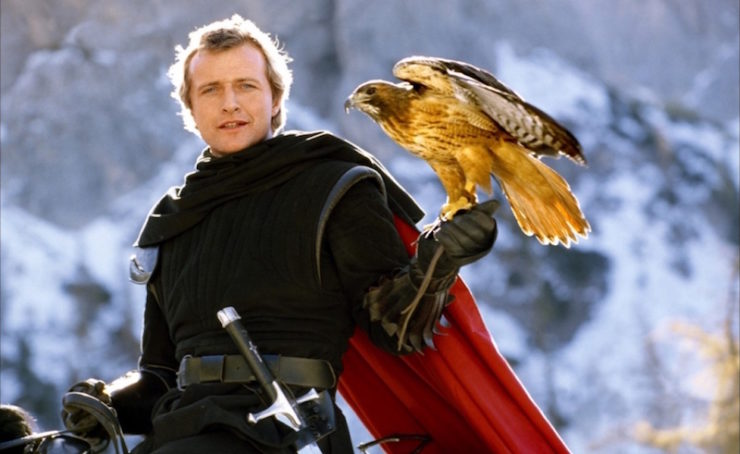
Ladyhawke is arguably the greatest of all ’80s fantasies. What is inarguable is that it features the best cinematic eclipse in movie history. Etienne Navarre is the knightiest knight who ever knighted, and his ladylove, Isabeau, is witty, beautiful, and a secret badass. Their love is pure and true, but unfortunately an eeee-villll bishop is also in love with Isabeau, and sells his soul to Satan in exchange for a curse on the couple. They are to remain “always together, yet eternally apart”, with Isabeau transforming into a hawk each morning at sunrise, and Navarre turning into a wolf as the sun sets each evening. And the only way to break the curse? To appear as man and woman before the Bishop himself. As you might well imagine, trying to live life a half-day at a time, while caring for either a hawk or a feral wolf, is not fun, especially not in Quasi-Medieval Fairy Tale Europe, and neither Navarre nor Isabeau can think of a way to escape this dire situation.
Luckily for the star-crossed pair, they run into a thief called The Mouse and an alcoholic monk named Imperius who work out a solution: when is it neither fully day, nor fully night? Why, during a solar eclipse of course, and one just happens to be coming up. Now all they have to do is smuggle a wolf-man and hawk-woman across France and into the Bishop’s church before the eclipse blots out the sun’s rays…
Nightfall
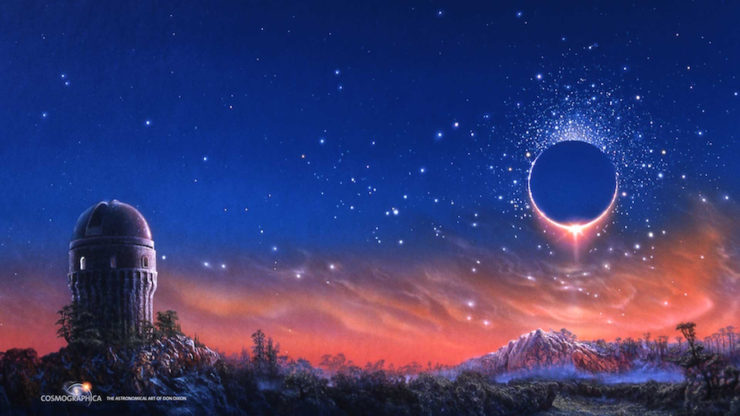
When your planet is surrounded by six suns, darkness itself is akin to the bogeyman: this creeping threat that you’ve never experienced, and never want to experience. How can you imagine such vulnerability, in a darkness that can neither be perceived nor fathomed, without going mad? If you’re the inhabitants of Kalgash in Isaac Asimov’s short story-turned-novel Nightfall, you sleep with night lights; you make darkness the big jump scare in theme park rides; and you fear the very real and very alien eclipse foretold to occur every 2,049 years.
Historical texts warn that every two millennia, the total eclipse has caused the downfall of civilization—surely when the inhabitants of Kalgash were plunged into darkness, they simply went insane? Not so, as the current society discovers: The eclipse not only blots out the suns, but it also reveals the stars. The stars that the Kalgash people had no idea existed. The hundreds of thousands of stars that force them to confront their own insignificance in a universe they used to believe they were at the center of.
It’s enough to send anyone spinning out of orbit. But hey, they have 2,049 years to rebuild…
The Wheel of Time
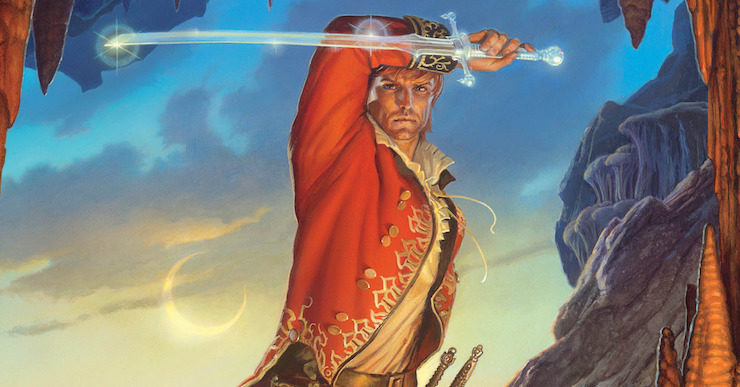
Twice dawns the day when his blood is shed.
Once for mourning, once for birth.
Red on black, the Dragon’s blood stains the rock of Shayol Ghul.
In the Pit of Doom shall his blood free men from the Shadow.
Wow! That’s one hell of a mission statement to give your epic fantasy hero. In the second book of Robert Jordan’s Wheel of Time, Rand al’Thor is still very much coming to terms with being the Dragon Reborn, the prophesied savior of the world, when he asks about prophecies that detail, you know, Next Steps. One of the prophecies includes this demoralizing stanza, letting Rand know that at some point he’ll probably find himself in the worst place in the world, exploding like a depressurized intestine.
Naturally, readers parsed this endgame-esque prophecy for clues, quickly determining that “twice dawns the day” probably indicated a solar eclipse. The imagery was apt for the series, which concerns itself with the decisive struggle between humanity (the Light) and an unequivocally evil metaphysical force (the Shadow) determined to end time itself. If a literal eclipse occurred at a key moment, it would have a symbolic effect upon the forces of the Light; a window where the Shadow held sway over the Light. The primal fear that would instill within the Lightside combatants could prove just enough to turn the tide of the conflict towards the Shadow. The “twice dawns the day” line is so important to the aesthetic of Jordan’s epic, in fact, that the final book in the series is titled “A Memory of Light”, with the cover itself featuring the very moment the prophecy proves true.
So it’s a bit of a puzzler that the eclipse just turns out to be a…cloudy day?
Above them, dark clouds spun, the peak of Shayol Ghul their axis. Darkness assaulted the sun until it was nearly gone, entirely covered, in total oblivion.
In the sentence following that, both the forces of the Light and the Shadow pause. Then the clouds pass in the sentence after that, and everyone resumes fighting as before. No eclipse, no ominous pauses the world over (yeah yeah we know that eclipses do not work that way), no sinking feeling from our favorite super-characters that they’re fighting a force of nature itself and none of this may be enough.
A bit of a cosmic shrug, all in all.
So I guess what we’re saying is that you can feel free to take “demoralizing eclipse” off your plate of woes. Phew!










